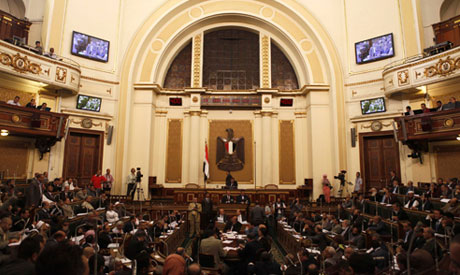
File photo: A general view shows the Shura Council during its meeting in Cairo May 25, 2013. (Photo: Reuters)
Egypt's High Constitutional Court has ruled unconstitutional a law governing elections for the Shura Council, the upper house of parliament.
The ruling on Sunday made it clear that the Council would not be dissolved until a new House of Representatives, the lower house of parliament, convenes. According to Article 230 of the constitution the council is immune from dissolution until a lower house is elected. The constitution also gives the upper house temporary authority to pass legislation after a similar court order caused the dissolution of Egypt's People's Assembly in June 2012.
'No practical effect'
The Muslim Brotherhood's Freedom and Justice Party (FJP) stated Sunday that the court ruling on the Shura Council, albeit legitimate, has 'no practical effect' since the Shura Council cannot be dissolved.
Essam El-Erian, a senior member of the Muslim Brotherhood's Freedom and Justice Party and a Shura Council member, said the ruling could, however, mean a reduction of the Council's four-year term.
“Or a presidential decree could be issued to hold supplementary elections for the one-third [of Council members affected by the ruling],” El-Erian added in a statement published on Facebook.
The second scenario is unlikely, he added.
The Council must ratify a Shura Council electoral law before the lower house is elected and convenes, because the Council is tasked with passing legislation until the lower house is elected, El-Erian said.
A date for House of Representative elections is yet to be set.
Mohamed Mahsoub, deputy head of the Islamist Wasat party, denounced Sunday's court ruling because “the constitution, which was approved by the people, has 'immunised' the Shura Council.”
“The Egyptian people endowed the Shura Council with full legislative powers when they voted in the constitutional referendum. No entity can call for its dissolution or interfere in its work,” said Mahsoub, who resigned as minister of parliamentary affairs in December in protest at PM Hisham Qandil continuing in his job, via Facebook.
The court also ruled that the law regulating elections for the constitution-drafting Constituent Assembly was unconstitutional.
It remains uncertain how the ruling will affect the constitution and whether actions and decisions taken under it will be annulled.
The Administrative Court still has to decide how to apply Sunday's court verdict and whether it will have any impact on the assembly and the constitution that was ratified by a national referendum in December 2012.
Sunday's rulings are the latest in a series of court orders challenging the legitimacy of the country's top political institutions. The Islamist-dominated People's Assembly (re-named the House of Representatives) was dissolved in June 2012 following a court order, two days before the presidential election runoff.
'Slow justice'
Founder of the Constitution Party Mohamed ElBaradei said on twitter on Sunday "the verdict of the High Constitutional Court is an expected outcome of the political bullying that toppled legitimacy and led to the state of collapse we are living in."
ElBaradei called for a new constituent assembly and a new election law - both to be ratified by the people in a popular referendum.
April 6 Youth Movement founder Ahmed Maher said Sunday's ruling was correct but comes eight months too late, which will negate its effect.
Former MP Ziad El-Eleimy of the Egyptian Social Democratic Party expressed similar sentiments.
"Slow justice is great injustice. The delay of the verdict makes it hard to implement. The Shura Council will remain in place until after elections for the House of the Representatives. And the Constituent Assembly is invalid but the constitution will remain because it was ratified by a national referendum,” El-Eleimy via Twitter on Sunday.
El-Eleimy said the solution must be political and based on consensus “so we can exit this vortex that is taking us into the unknown.”
Short link: